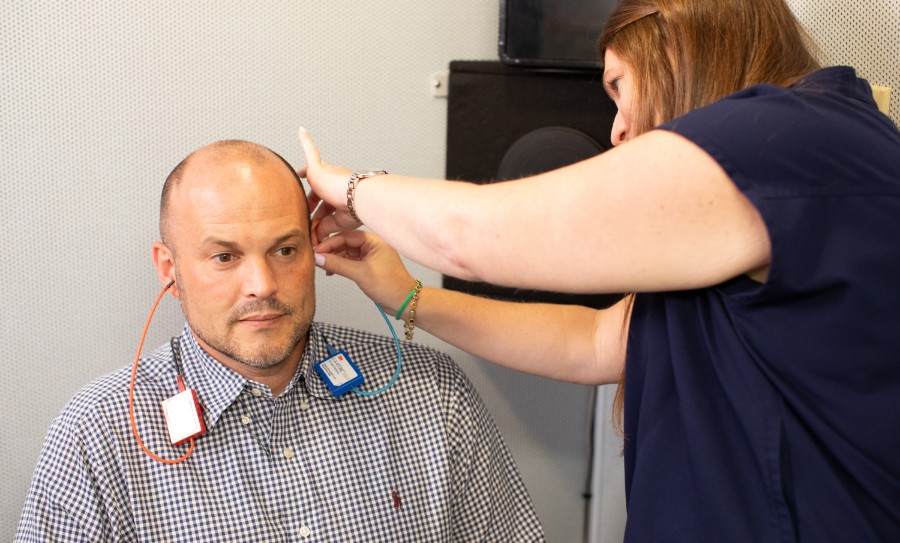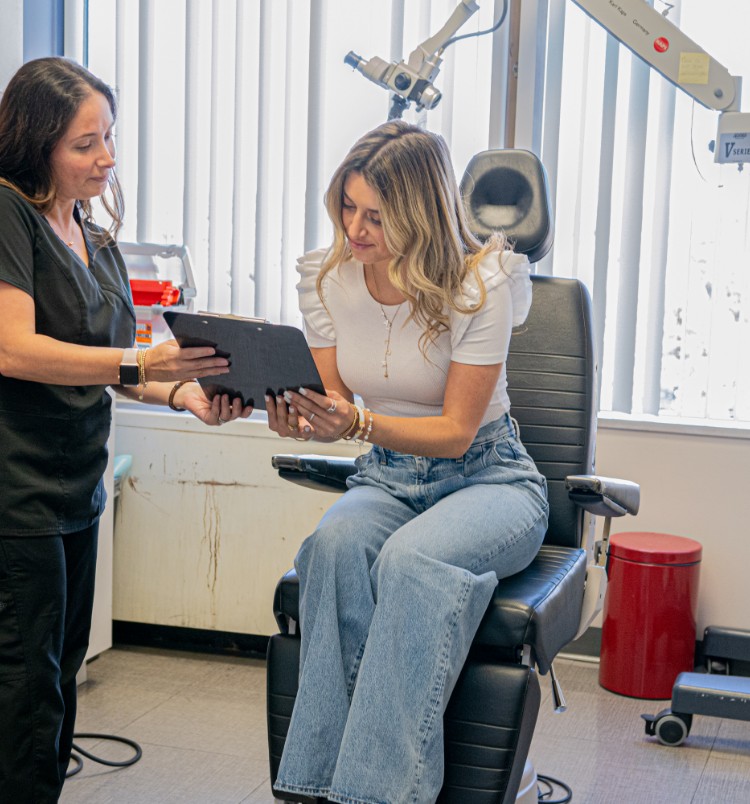
Are you finding that your hearing isn't quite what it used to be? If so, you may want to consider hearing aids. There is no need to feel embarrassed or ashamed—hearing loss is common and affects one in three people over the age of 65. We understand how difficult this can make life, which is why ENT and Allergy Associates is here to support you through this journey, helping to provide advice on the technology to best meet your needs.
Our audiologists offer comprehensive, educational hearing aid consultations, where we will evaluate your individual needs and help you select the brand, style, and technologies that will be best for you. We offer devices from premier hearing aid manufacturers since our patients clearly do best with these; however, these high-quality devices are still available in a broad price range and can even be competitive with some "discount" hearing aids.
Investing in Hearing Aids
Before investing in hearing aids, a comprehensive hearing test by an audiologist and an evaluation by an ENT physician are important to confirm there are no medical or surgical options available to correct your hearing loss. Once medically cleared, the journey towards identifying appropriate hearing aids can begin.
During your hearing aid consultation appointment, you and your audiologist will select a hearing device that best suits your needs. Our goal is to find the most appropriate solution for your hearing loss, lifestyle, and budget. We understand that every patient has individual needs, and we will work with you to develop a plan supported by the right devices to ensure you are hearing optimally.
Do I Need One or Two Hearing Aids?
If you have hearing loss in both ears, the audiologist will often recommend that you use two hearing aids. Just as correcting the vision in only one eye will not improve peripheral vision or depth perception, aiding just one ear will not improve hearing performance in more challenging environments such as social gatherings and restaurants, where hearing loss is most bothersome. To benefit where it matters most, two hearing aids are often required.
Make an appointment with ENT and Allergy Associates today. We are the nation’s leading provider of ENT, allergy, and audiology services and we are ready to help you overcome any hearing issues you are dealing with!

When it comes to hearing aids, there are many factors to consider, from design and size to special features and ease of use.
But regardless of these differences, all hearing aids share a common set of components:
- Microphone to capture sound
- Amplifier circuitry to boost the volume
- Receiver (or miniature loudspeaker) to transmit the amplified sound into the ear
- Energy supply to power the electronic parts
Depending on your specific listening needs, type of hearing loss, and lifestyle, your audiologist can help you determine which hearing aid style and features will best suit your communication needs. They will also be able to recommend the best match for your listening needs and budget.
Styles of Hearing Aids
The audiologists at ENT and Allergy Associates will explain to you the various styles of hearing aids and which ones are right for you.
Here are four common styles:
- In-the-canal and completely-in-the-canal aids: These tiny aids fit directly into your ear canal, offering an exceptional level of discretion and improved hearing functionality.
- In-the-ear aids: Larger than canal aids but still incredibly manageable, in-the-ear aids are an excellent option for those who want something practical yet easy to handle.
- Behind-the-ear aids: If you're looking for a safe and versatile option, these aids are a great choice for young children, and they offer crystal-clear sound thanks to the small plastic casing.
- Receiver-in-the-Ear (RITE): The most popular hearing aids on the market, these RITE options combine advanced technology with unsurpassed cosmetic appeal.
Fortunately, there's a hearing aid solution tailored to any level of hearing loss. Contact us today to find the perfect aid for you.
Hearing Aid FAQ
Here at ENT and Allergy Associates, our audiologists often get asked many of the same questions about hearing aids. Below you’ll find the answers to some common questions:
Will hearing aids help me hear better on the telephone or in public places?
If you have hearing loss, hearing aids can significantly improve speech clarity during telephone conversations. Hearing aids today are Bluetooth compatible and connect directly with your cellphone, streaming your conversation and other media directly to your hearing aids.
For those who frequently use landline phones, consider hearing aids equipped with "T" (telecoil) circuits, which efficiently amplify phone sounds and reduce background noise. Note that not all cordless phones work well with hearing aids.
Additionally, individuals with hearing loss may benefit from using a telecoil with assistive listening sound systems available in auditoriums, theaters, and public places as mandated by federal law. Be sure to consult with your audiologist about the option of a "T" switch.
Will hearing aids eliminate all my communication problems?
With hearing aids, you may discover sounds you've been missing or haven't heard in a while. While adjusting, background noises may seem overwhelming, and your own voice may sound amplified. Don't worry, it's normal for some people to take weeks to become accustomed to new hearing aids. Our audiologists will provide hearing aid orientation and rehabilitation to help you communicate effectively. So, give hearing aids a chance to enhance your hearing experience!
Will my health insurance pay any of the costs of acquiring a hearing aid?
Some private health care plans cover the costs of audiological tests, a hearing aid evaluation, and even partial or full coverage of a hearing aid. Check with your health insurance company or your benefits manager to find out exactly what audiology services your policy covers. You may wish to advocate for the inclusion of audiology services in your plan if not included. At this time, Medicare does not cover hearing aids, while Medicaid and some Medicare Advantage plans often do.
ENT and Allergy Associates participates with some, but not all, private health care plans. Please ask your audiologist for more information to see if you may have an insurance benefit.
Patient Stories
-
"Very good experience. Highly recommend"
- Victor S. -
"Beyond expectations, I felt comfortable, at ease, and left without any questions unanswered, knowing that his approach to my situation was working and the right course of treatment."
- R.E. -
"Really listens to your concerns. Super thorough & knowledgeable."
- M.L.
Less Sick Days, More Living

Read More about Hearing Aids
-
Over the Counter (OTC) Hearing Aids
As the world of hearing aids continues to evolve and change, audiologists are receiving more questions than ever. Myriad ...
-
Hearing Aid Hygiene
Considering recent events, it is more important than ever to be diligent in the cleaning of our hearing aids and ensure ...
